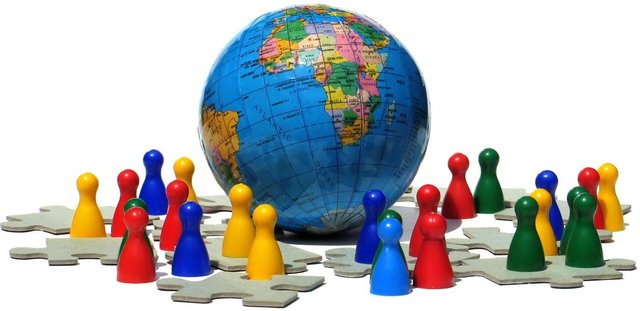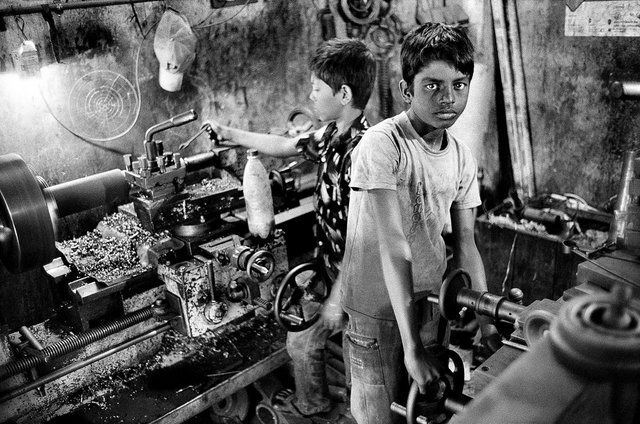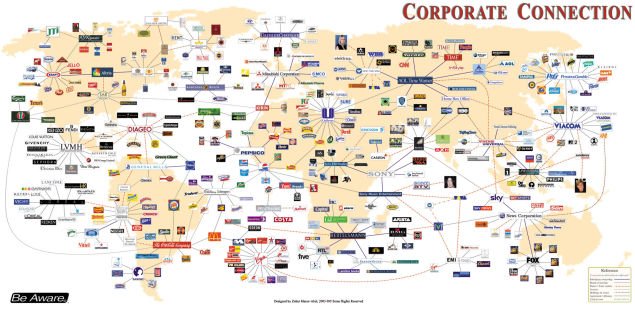Is A World Full Of Developed Economies Possible, Or Are Developed Nations Stopping That From Happening?
Is A World Full Of Developed Economies Possible, Or Are Developed Nations Stopping That From Happening?
In the west, our consumerist and capitalist societies are often the source of many problems in the world economy. We desire too much, and we desire it all at a price point far too low.With outsourcing of manufacturing and cheap foreign wages we can achieve our goals, but what happens when the cheap labor runs out? In many of our lifetimes, manufacturing has moved from country to country as the cost of labor becomes higher and it no longer makes sense for a company to stay in a certain country. After, the company leaves and the country it used to manufacture in starts to have future growth stop. If we eventually are able to get to a point where all economies become fully developed first world economies, life for mankind would be easier. However is this really what first world western nations want?

If all countries were developed, it would almost definitely mean that countries in the undeveloped world with massive potential would grab a much larger piece of the world economy’s pie. I believe even if it raises the well being of all humans, countries that are currently in the lead of development want to stop it from happening. In my opinion outsourcing manufacturing to extremely cheap labor, is keeping a country from developing further. Countries aren’t directly making the decisions to outsource, but our companies are, and in a weird way our companies are an extension of our country. Rather than nations moving towards self sufficiency , we are seeing a larger amount of them catering to extremely low wages. If we look at China for example, minimum wage has been brought up multiple times but it is always shutdown because if China instituted minimum wage, overnight they would lose a large portion of companies that choose to manufacture there. In a way I think it is a form of, what I like to call, Capitalist Imperialism that is taking place. By exploiting cheap labor and putting pressure on governments to choose options which are not in their citizens best interest, we are keeping them relatively undeveloped. Because we can not control them like we used to control our colonies, we use what we have available which is to control them by impacting their economies.

Although there have been some success stories of countries that had foreign investment and started large manufacturing infrastructures, most of them were owned by their own companies. This is not the same with what is going on today and even with the countries that became success stories, manufacturing heavy economies that try to raise the quality of life are starting to see shrinkage in what they bring in. Companies, no matter what country they come from will always seek out the cheapest labor and costs, so this shrinkage we are seeing is near impossible to avoid. So I ask a question, is a world with all developed countries even possible?
There are only so many jobs that can be done by fully developed countries, unless a massive paradigm shift takes place, for example, completely self sufficient countries. In an international world we all must rely on each other for trade and prosperity, but companies and governments are taking advantage of the underdeveloped. This is how the free market should operate but also, it crushes any hopes of certain economies getting past a certain point.

Eventually they will hit a point where more manufacturing won’t make them anymore money, and there are not enough people trained in jobs that make economies developed. Specialization of products is probably the best route, but even in that case, we have seen many countries face competition which has hurt their economies past the point of no return. I just don’t currently see a fully developed world happening without a massive shock and redistribution of wealth within the global economies.
Western companies will always use the cheapest option available to them which often means exploiting new sources of labor over and over again until robotics gets to a point where it is cheaper than human labor. If this current pattern continues, economies which choose manufacturing for foreign companies will continue to grow and shrink, never becoming a mainstream developed economy. Even if we create a basic manufacturing infrastructure to a country when we build factories and use their labor, without specialization of their own products the world wants the economies wont grow past a point. Let me know if you think a world full of totally developed economies is possible and how it could happen.
-Calaber24p
I think it is possible but each economy would be different depending on the resources it owns... There is no way all economies would be equal, but they could all be developed to an extent. I feel like this is happening right now with the US. It has basically stalled out with all of the outsourcing of jobs while other less developed countries "catch up". At some point the entire globe will be close to one another in terms of development... Then the deciding factor will only be resources and population...
Article was well worth the read, thank you.
imo, the world could have all 'developed' economies, but they would look very different from what we see today. I personally don't consider a consumerist debt based economy to be developed in any positive sense of the world. Greed and Scarcity Mindset rule the top end of the western world and until that changes the less developed countries won't stand a chance of any meaningful growth.
I agree, I dont think today western nations, especially ones with money want any country that would not be a valuable ally, to succeed.
Smaller and developing countries faced a lot of obstacles in their quest towards development. Some of the obstacles or barriers are imposed by developed countries. Goods are either banned or face with high tariffs in developed countries due to a lot of factors eg developed countries claimed that timber is not harvested from sustainable forests, the anti oil palm lobby etc
Yeah it stinks that this is the way the world works, especially because the international monetary community will often force countries to buy into their system to even have a chance at success. If you are not one of the top 10 developed countries, you dont stand a chance at growing to their level.
Now, it is terrible. If you work in outsourcing companies in developing countries, you will understand the problems of injustice. Product selling prices 1 usd to consumers when priced 3 -5 usd.
The peer to peer economies will change the world.
Regulations like minimum wage are what pushes the search for Labor around. I live in a so called 2nd World country, and the problem here is corruption and a toxic management culture that springs from it. It isn't the same everywhere but you make a good point about local startups.
Interestingly, in fact the local outsourcing businesses struggle to find and keep employees, even when management is expats as well.
The real issue is that outsourcing is a defensive strategy. This means these companies are far from innovative also. There will always be a scale of success for any given market relative to others, but the real issue is a lack of innovation.
I left my native country to find work elsewhere. I curse on the regulatory environment at home, it stopped me fnding stable employment in so many ways. Where I am now is better but what I hope to bring is innovation, in partnership with local capitalists with vision.
Free market solutions appear where they can or must. They succeed most when they can leverage the gaps in what is not regulated where they operate. It is a difficult environment but you cannot work with politicians, they may help you directly but they will then smother your field.
When people realise value is subjective and cannot be legislated, a lot will change. But in the meantime, the biggest opportunity lies in building market systems that resist recognition when they find a gap, and defend themselves with innovations that let more people join without joining the rat race.
More than anything else, the biggest leaps come when people can bridge markets and eliminate borders. Arbitrage, basically. That is why to the extent it succeeds, outsourcing is successful. Barriers to trade only help politicians and their cronies.
The economist Ha-Joon Chang's book Bad Samaritans gives a fresh look on this, and also completely debunks what was said here before in the comments about free markets and trade barriers.
"Bad Samaritans was an introduction to open-minded economists and political free-thinkers to Ha-Joon Chang's theories of the dangers of free-trade. With irreverent wit, an engagingly personal style, and a keen grasp of history, Chang blasts holes in the "World Is Flat" orthodoxy of Thomas Friedman and others who argue that only unfettered capitalism and wide-open international trade can lift struggling nations out of poverty. On the contrary, Chang shows, today's economic superpowers-from the U.S. to Britain to his native Korea-all attained prosperity by shameless protectionism and government intervention in industry, a fact conveniently forgotten now that they want to compete in foreign markets. Chang's cage-rattling, contrarian history of global capital appeals to readers new to economic theory as well as members of the old school looking for a fresh take."
Wow, it's all so true, you can't even imagine!
Replacing workers when the raised cost is legislated is not the fault of companies. But political interference is on the whole always the biggest business cost. You should look into how high compliance costs are. They do not increase value but eat profits, lower wages and stimulate automation that would otherwise not exist.
Some good points.
However, I invite you to learn more about what "minimum wage" does and how it's actually beneficial or not: http://www.learnliberty.org/?s=wage
Countries, like those being "used" or "exploited" for their low cost labor, need to develop their own self-sufficient economic internal dynamics in order to free themselves from these corporations, if they are indeed a negative upon their way of life. For now, ask, does someone working and being able to earn an income from these corporations, a bad or actually a good thing? What if the corporation was not there to even offer employment? Where and how would they generate an income.
Take care. Peace.
A great post well worth the read. Up-voted and following & looking forward to seeing more of your posts. Posted a couple of articles earlier that you and your followers may find interesting.
"Where we're going we won't need central banking!!"
https://steemit.com/steemit/@stephenkendal/where-we-re-going-we-won-t-need-central-banking
"A future without central banking be careful what you wish for because sometimes dreams do come true!!"
https://steemit.com/steemit/@stephenkendal/a-future-without-central-banking-be-careful-what-you-wish-for-because-sometimes-dreams-do-come-true
Cheers.
Stephen